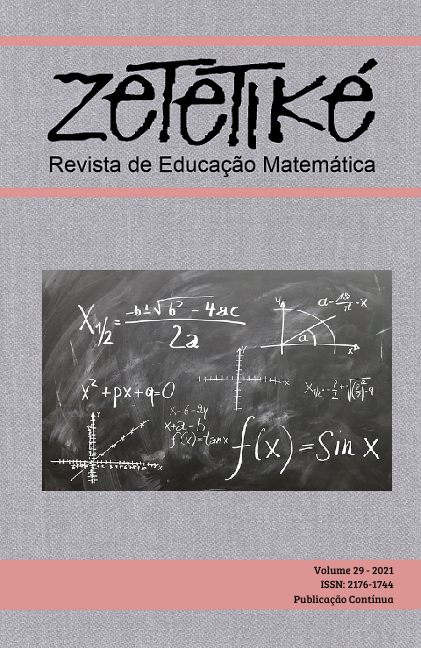Abstract
Our research focuses on Mathematics Teacher Educator specialized knowledge. By means theoretical tools driven from Mathematics Teacher Specialized Knowledge model (MTSK model) we focus on teacher educators’ specialized knowledge and carry out a qualitative study in order to identify specific dimensions and domains of mathematics teacher educators’ specialized knowledge. We explore an extension of the MTSK model that can characterize the teacher educator’s specialized knowledge (Mathematics Teacher Educator Specialized Knowledge model) - MTESK model. Specifically, our focus will be on the Pedagogical Content Knowledge of the MTESK model.
References
Aldon, G., Arzarello, F., Cusi, A., Garuti, R., Martignone, F., Robutti, O., Sabena, C., & Soury-Lavergne, S. (2013). The meta-didactical transposition: a model for analysing teachers education programs. In Lindmeier, A. M. & Heinze, A. (Eds.). Proceedings of the 37th Conference of the International Group for the Psychology of Mathematics Education (Vol. 1, pp. 97–124). Kiel, Germany: PME.
Ball, D. ., Thames, M. H., & Phelps, G. (2008). Content knowledge for teaching: What makes it special? Journal of Teacher Education, 59(5), 389–407.
Beswick, K., & Goos, M. (2018). Mathematics teacher educator knowledge: What do we know and where to from here? Journal of Mathematics Teacher Education, 21, 417–427.
Carrillo-Yáñez, J., Climent, N., Montes, M., Contreras, L.C., Flores-Medrano, E., Escudero-Ávila, D., … Muñoz-Catalán, M.C. (2018). The mathematics teacher’s specialised knowledge (MTSK) model. Research in Mathematics Education, 20(3), 236–253.
Escudero-Ávila, D., Montes, M., & Contreras, L.C. (2021). What do mathematics teacher educators need to know? Reflections emerging from the content of mathematics teacher education. In M. Goos, & K. Beswick (Eds.), The Learning and Development of Mathematics Teacher Educators, (pp. to appear). Cham, Switzerland: Springer.
Even R., Krainer K., Huang R. (2020). Education of Mathematics Teacher Educators. In: Lerman S. (eds), Encyclopedia of Mathematics Education. Springer, Cham.
Flores, E., Escudero, D. I., & Carrillo, J. (2013). A theoretical review of specialised content Knowledge. In B. Ubuz, C. Haser & M. A. Mariotti (Eds.), Proc. VIII Congress of the European Society for Research in Mathematics Education (CERME 8) (pp. 3055–3064). Antalya, Turkey: Middle East Technical University, Ankara.
Krainer K., Chapman O., Zaslavsky O. (2020). Mathematics Teacher Educator as Learner. In Lerman S. (eds) Encyclopedia of Mathematics Education. Springer, Cham.
Jaworski, B. (2008). Mathematics teacher educator learning and development: An introduction. In International Handbook of Mathematics Teacher Education (Vol. 4, pp. 1–13). Brill Sense.
Llinares, S., & Krainer, K. (2006). Mathematics (student) teachers and teacher educators as learners. In A. Gutiérrez & P. Boero (eds.), Handbook of research on the psychology of mathematics education (pp. 429–459). Brill Sense.
Loughran, J. (2014). Professionally developing as a teacher educator. Journal of teacher education, 65(4), 271–283.
Martignone, F., Ferretti, F., & Rodríguez-Muñiz (submitted). What should be the specialised knowledge of a mathematics teacher educator?
Montes, M. A., Aguilar, A., Carrillo, J., & Muñoz-Catalán, M. C. (2013). MTSK: from common and horizon knowledge to knowledge of topics and structures. In B. Ubuz, C. Haser & M. A. Mariotti (Eds.), Proc. VIII Congress of the European Society for Research in Mathematics Education (CERME 8) (pp. 3185–3194). Antalya, Turkey: Middle East Technical University, Ankara.
Patton, M. (2002). Qualitative research and evaluation methods. London, UK: Sage Publications.
Prediger, S., Roesken-Winter, B., & Leuders, T. (2019). Which research can support PD facilitators? Strategies for content-related PD research in the Three-Tetrahedron, Model. Journal of Mathematics Teacher Education, 22, 407–425.
Rasmussen, C., Zandieh, M,. & Wawro, M. (2009). How do you know which way the arrows go? The emergence and brokering of a classroom mathematics practice. In W.M. Roth (Ed.), Mathematical representations at the interface of the body and culture (pp. 171–218). Charlotte: Information Age Publishing.
Ribeiro, M., Martignone, F., Aslan-Tutak, F., Rø, K., & Montes, M. (2019). Introduction to the papers of TWG20: Mathematics teacher knowledge, beliefs, and identity. In: U. T. Jankvist, M. van den Heuvel-Panhuizen, & M. Veldhuis (Eds.), Proceedings of the Eleventh Congress of the European Society for Research in Mathematics Education, (pp. 3811-3814). Utrecht, the Netherlands: Freudenthal Group & Freudenthal Institute, Utrecht University and ERME.
Robutti O. (2020) Meta-didactical Transposition. In: Lerman S. (eds) Encyclopedia of Mathematics Education. Springer, Cham.
Shulman, L. (2008). Content knowledge for teaching: What makes it special. Journal of Teacher Education, 59(5), 389–407.
Tzur, R. (2001). Becoming a mathematics teacher-educator: Conceptualizing the terrain through self-reflective analysis. Journal of Mathematics Teacher Education, 4(4), 259–283.
Zeichner, K. (2005). Becoming a teacher educator: A personal perspective. Teaching and teacher education, 21(2), 117–124.

This work is licensed under a Creative Commons Attribution-NonCommercial-NoDerivatives 4.0 International License.
Copyright (c) 2021 Zetetiké


